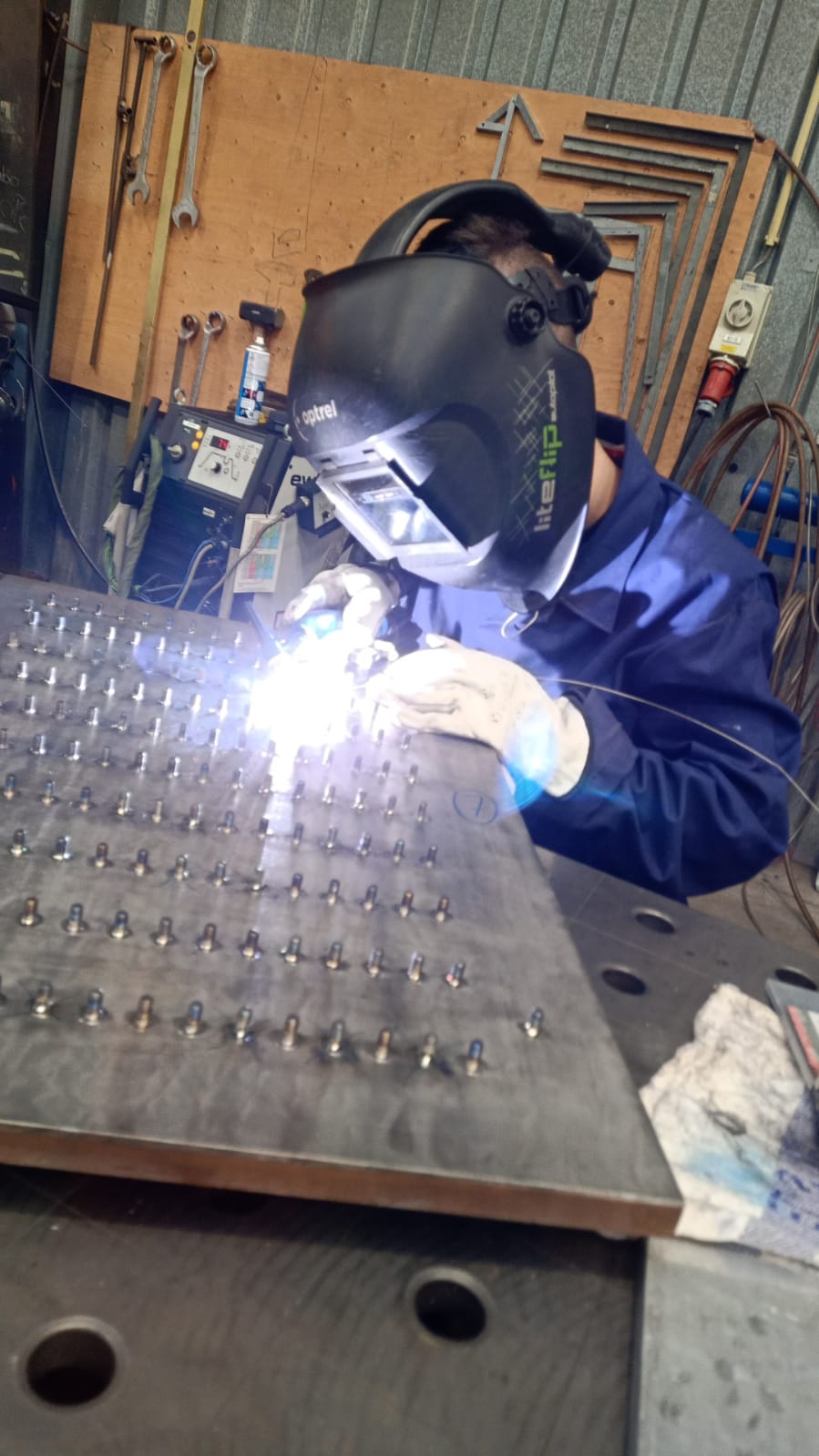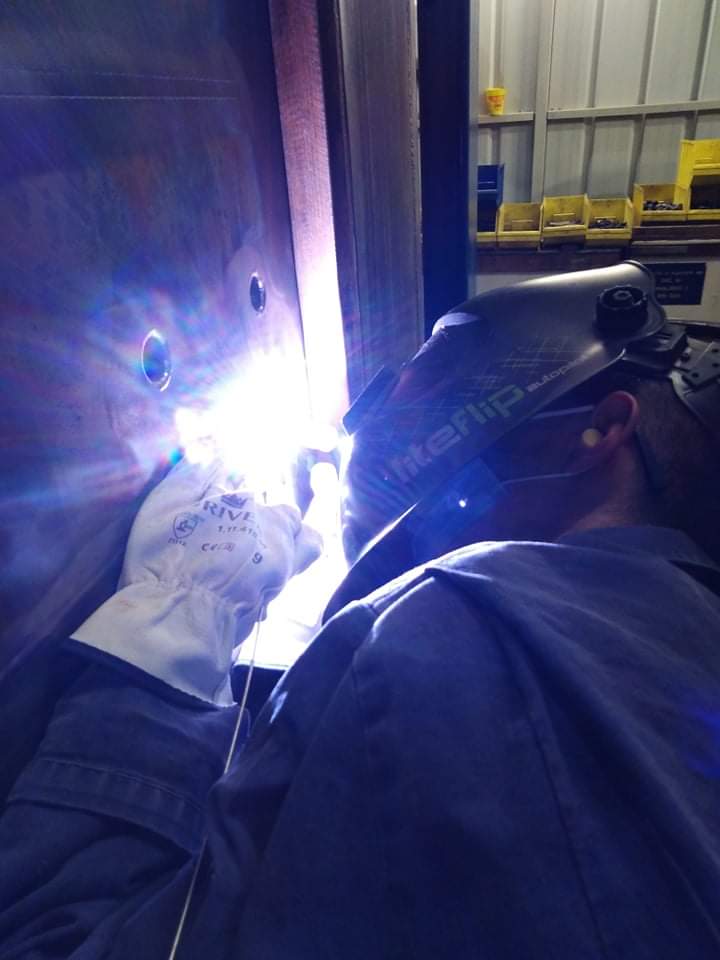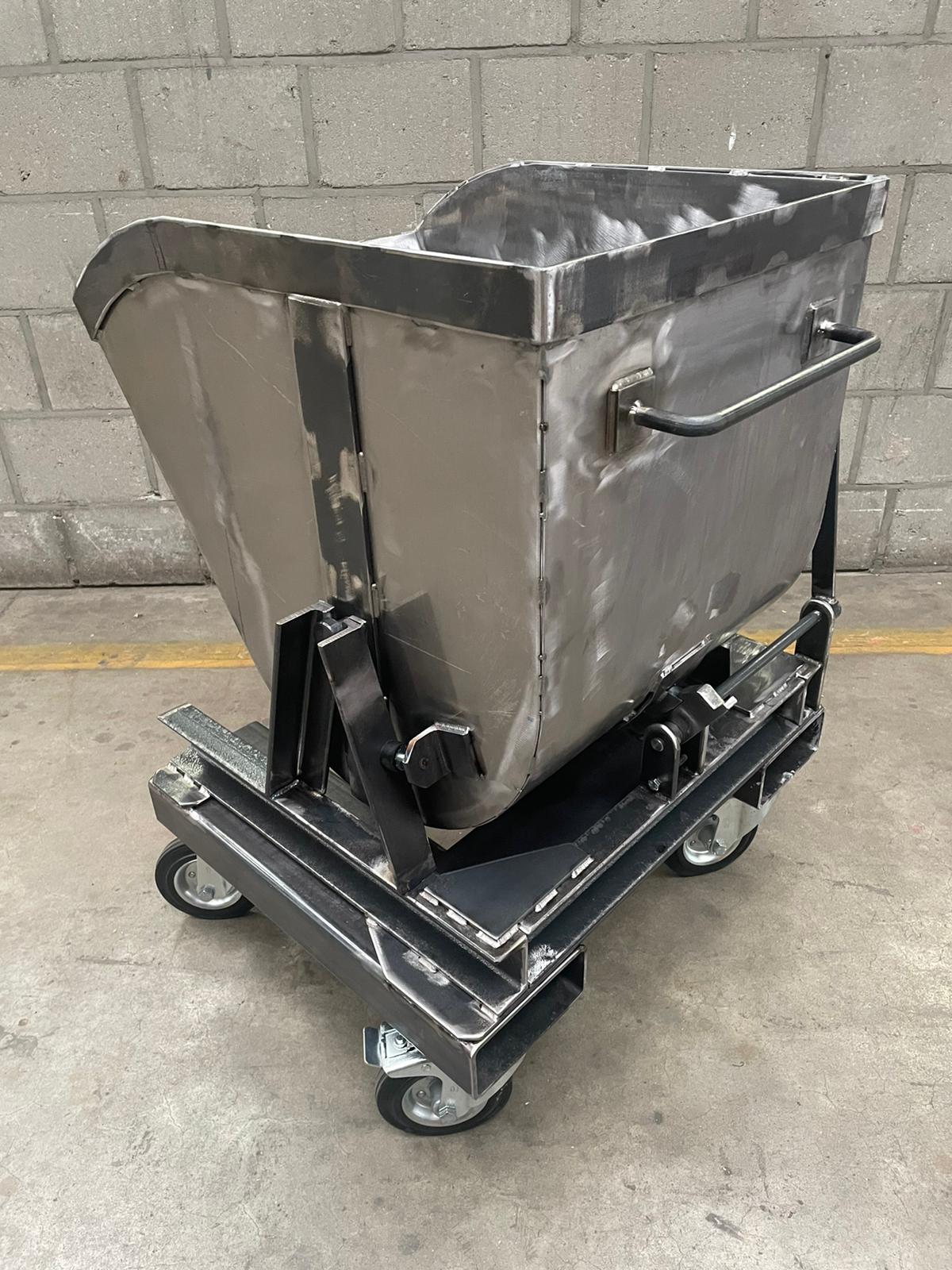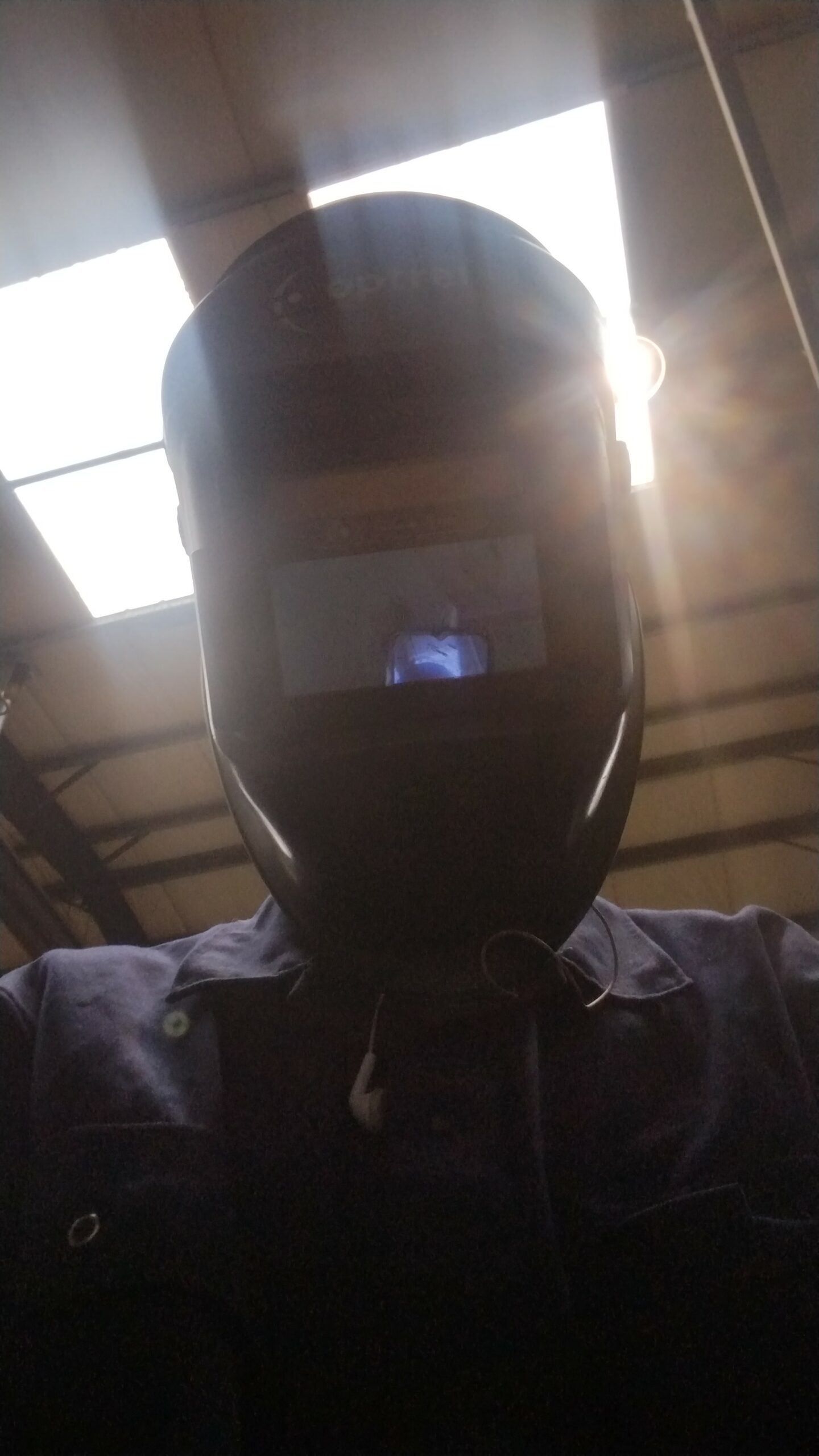Jamie lives in the Netherlands and recently completed his degree as an all-around construction worker, with training in welding. He’s currently switching jobs to become a full-time welder and has two job offers he’d like our help deciding between. Additionally, he and his girlfriend dream of living and working abroad some day. Jamie lost his father when he was just 13 and has been working and helping his mother financially since then. At just 21 years old, Jamie has more insight, determination and financial savvy than most folks twice his age. Join me on a trip to the Netherlands as we help Jamie chart a bright future!
What’s a Reader Case Study?
Case Studies address financial and life dilemmas that readers of Frugalwoods send in requesting advice. Then, we (that’d be me and YOU, dear reader) read through their situation and provide advice, encouragement, insight and feedback in the comments section.
For an example, check out the last case study. Case Studies are updated by participants (at the end of the post) several months after the Case is featured. Visit this page for links to all updated Case Studies.
Can I Be A Reader Case Study?
There are three options for folks interested in receiving a holistic Frugalwoods financial consultation:
- Apply to be an on-the-blog Case Study subject here.
- Hire me for a private financial consultation here.
- Schedule an hourlong call with me here.
To learn more about one-on-one consultations with me, check this out.
Please note that space is limited for all of the above and most especially for on-the-blog Case Studies. I do my best to accommodate everyone who applies, but there are a limited number of slots available each month. Another way to get Frugalwoodsy advice is to…
Join a UFM Mastermind Group
There’s a BRAND NEW way to participate in my Uber Frugal Month Challenge: join a Mastermind Group!!!! These groups are your chance to meet (on video) with me and 9 other frugal folks once a week for 5 weeks starting in January! Read more here; sign-up to join here.
The Goal Of Reader Case Studies
Reader Case Studies highlight a diverse range of financial situations, ages, ethnicities, locations, goals, careers, incomes, family compositions and more!
The Case Study series began in 2016 and, to date, there’ve been 89 Case Studies. I’ve featured folks with annual incomes ranging from $17k to $200k+ and net worths ranging from -$300k to $2.9M+.
I’ve featured single, married, partnered, divorced, child-filled and child-free households. I’ve featured gay, straight, queer, bisexual and polyamorous people. I’ve featured women, non-binary folks and men. I’ve featured transgender and cisgender people. I’ve had cat people and dog people. I’ve featured folks from the US, Australia, Canada, England, South Africa, Spain, Finland, the Netherlands, Germany and France. I’ve featured people with PhDs and people with high school diplomas. I’ve featured people in their early 20’s and people in their late 60’s. I’ve featured folks who live on farms and folks who live in New York City.
Reader Case Study Guidelines
I probably don’t need to say the following because you folks are the kindest, most polite commenters on the internet, but please note that Frugalwoods is a judgement-free zone where we endeavor to help one another, not condemn.
There’s no room for rudeness here. The goal is to create a supportive environment where we all acknowledge we’re human, we’re flawed, but we choose to be here together, workshopping our money and our lives with positive, proactive suggestions and ideas.
A disclaimer that I am not a trained financial professional and I encourage people not to make serious financial decisions based solely on what one person on the internet advises.
I encourage everyone to do their own research to determine the best course of action for their finances. I am not a financial advisor and I am not your financial advisor.
With that I’ll let Jamie, today’s Case Study subject, take it from here!
Jamie’s Story
Hello, Frugalwoods! My name is Jamie, I’m 21 years old and I live in the Netherlands. I just finished my MBO 3 degree as an all-around construction worker, with training in welding and am currently switching jobs to become a full-time welder. My girlfriend, Rosalyn, 22 years old, works as an accountant and lives in the Philippines (Iloilo). I met her online via an app that was meant to talk with people and make friends, but we wanted more then that. In June of this year I flew to the Philippines (first time flying!) and met her in person. We really hit it off and look forward to possibly moving abroad together. I don’t own any pets and don’t have children.
I learned about FIRE from my friend Jay. She’s given me tips and shown me a lot of stuff I did wrong. I have changed those things for the most part, but there is still a lot to learn.
What feels most pressing right now? What brings you to submit a Case Study?
I’ve a problem when it comes to my family. My family is poor and they often ask to borrow money, which I have to fight to get back. I am working on this and am getting better at saying “no.” My family has been using me as a free taxi driver, personal handywoman, interest-free bank, etc. The amount of debt my family members owe me totals €47,495.
I also have a fear of spending money. I started working when I was 13 as my father passed away back then, and my mother made nowhere near enough money to survive. After school, on weekends and vacations, I went to work. There were a couple times we were almost homeless, but I managed to pay our bills on time. This is what makes me have a fear of spending. I don’t ever want to return to those times and I don’t want my potential future family to ever experience this. But I don’t regret my past because those experiences made me the hard-working person I am today.
I also want to move away from the Netherlands eventually, probably by working abroad in other countries. What I hope to get from this Case Study are some useful tips so I can eventually achieve my goals.
What also is pressing currently is choosing my career path. As of now, I am thinking about taking a new job for 1 to 2 years to save money and hopefully be paid back by my family before moving abroad.
I currently have two job offers to consider:
1) a higher-paid, general welding job.
2) a lower-paid welding job, but one where I would learn pipe welding.
This second job would require me to stay longer, or pay back the cost of schooling if I didn’t remain with the company after finishing their classes. Pipe welding has the potential to pay a lot more later on, but I also think it’s something that can be learned on the job, since I already know general welding.
I do want to travel abroad eventually, for the adventure, and just to learn about different people and places and see if somewhere else is a better fit for me than the Netherlands.
Does anyone have suggestions on where to go abroad to work as a welder?
I eventually want to work abroad for 1 to 2 years, and then decide to either stay, move forward to a different country and see if that’s a better match, or return to the Netherlands. Does anyone have advice about this?
What’s the best part of your current lifestyle/routine?
I like the field I am in, but not so much my last job. I also have a lot of side jobs which are okay too, such as: watching pets/children, helping renovate houses, working on back/front-yards, taxi driving, etc. Those side jobs are not official, and I don’t charge much for them, as they are either easy jobs or jobs I learn from, which eventually will be useful when I live on my own.
I still live with my mother to save money, but, I have helped her financially since my father passed away when I was age 13 (I’ve lent her €38,245 in total).
Where Jamie Wants to be in Ten Years:
Finances:
Lifestyle:
- I want to be able to travel the world and not have to worry about finances all the time.
Career:
- I’m interested in eventually having my own welding workplace or shop, and potentially rental properties.
Jamie’s Finances
Note: all amounts are listed in Euros (€). As of this writing, €1 = $1.05 US Dollars.
Income
| Item | Amount | Notes |
| Welding job | €1,627.12 | My net salary with taxes and insurance taken out |
| Monthly subtotal: | €1,627.12 | |
| Annual total: | €19,525.44 |
Note: I also typically earn €500-€1,500 per month from my side jobs, but I didn’t include that in the total since it’s variable.
Debts: None
Assets
| Item | Amount | Notes | Interest/type of securities held/Stock ticker | Name of bank/brokerage | Expense Ratio |
| Investment account | €5,471 | my broker | Multiple index funds such as iShare Core MSCI World UCITS ETF USD (Acc) | degiro | 0.98% |
| Savings account | €4,523 | my savings account where I store my leftover money, donate money, lend money to support my sister’s child, investing money, savings for a new car | earns 0.40% interest | leaseplanbank | N/A |
| Deposits | €2,000 | 2 deposits of 1k each, one ends 1 oktober 2022 the other 6 april 20023 | 0.25% interest | leaseplanbank | N/A |
| Cash | €1,254 | no interest/fees | N/A | N/A | |
| Checking account | €300 | I make sure there is just enough money in there to pay bills | student account, no fees | ABN Amro | 0% |
| Total: | €13,548 |
Vehicles
| Vehicle make, model, year | Valued at | Mileage | Paid off? |
| Peugeot 206 | €1,200 | 212,836 km | yes |
| Bicycle | €1,000 | 150,00km | yes |
| Total: | €2,200 |
Expenses
My expenses are a bit unusual because I live with my mother and she pays for my food, housing and utilities. In exchange, I help her around the house, fix her car and do other odd jobs for her. I’ve also lent her €38,245 to help her out over the years.
| Item | Amount | Notes |
| health insurance | €142 | |
| traveling | €142 | vacation to my girlfriend |
| fuel for car | €60 | I use my bicycle as often a possible |
| car savings | €40 | Savings for a new car |
| taxes | €27 | |
| christmas | €21 | christmas gifts for 3 people and my girlfriend in another country |
| birthday gifts | €20 | most gifts I make myself, I do have to pay for materials and shipping to another country |
| charitable donations | €10 | |
| trade union | €2 | |
| clothes | €1 | I barely buy clothes. Most of my clothing was given to me for a birthday/holiday or are hand-me-downs |
| Monthly subtotal: | €464 | |
| Annual total: | €5,568 |
Credit Cards: none
Jamie’s Questions for You:
1) I have a difficult decision ahead as I have to choose between 2 jobs:
- At job #1 I would be a welder, at a higher pay, but I wouldn’t learn how to weld pipes. I’m not sure, but I think if I want to weld aboard I will need pipe welding experience and I don’t know if a future employer would be willing to teach me. But this job does pay better and I wouldn’t be attached to a school. Plus, I would learn how to MIG weld at this job, which is a benefit as I think a lot of employers expect a welder to be able to do both TIG and MIG welding.
- Job #2 would give me the opportunity to learn TIG pipe welding (I can TIG weld, I just don’t have experience with pipes yet) but I would also need to go to school once a week, which this company would pay for. However, since I don’t plan on staying for years at this company here in the Netherlands, I would eventually have to pay it all back. So that’s a bit of a negative about this job.
- Which should I choose?
2) I would like suggestions on how to better my financial situation.
- And, if I’m doing something wrong, what should I change?
3) I would like to work abroad as welder–anywhere in the world where they need a welder.
- Does anyone have advice on how to get started?
Liz Frugalwoods’ Recommendations
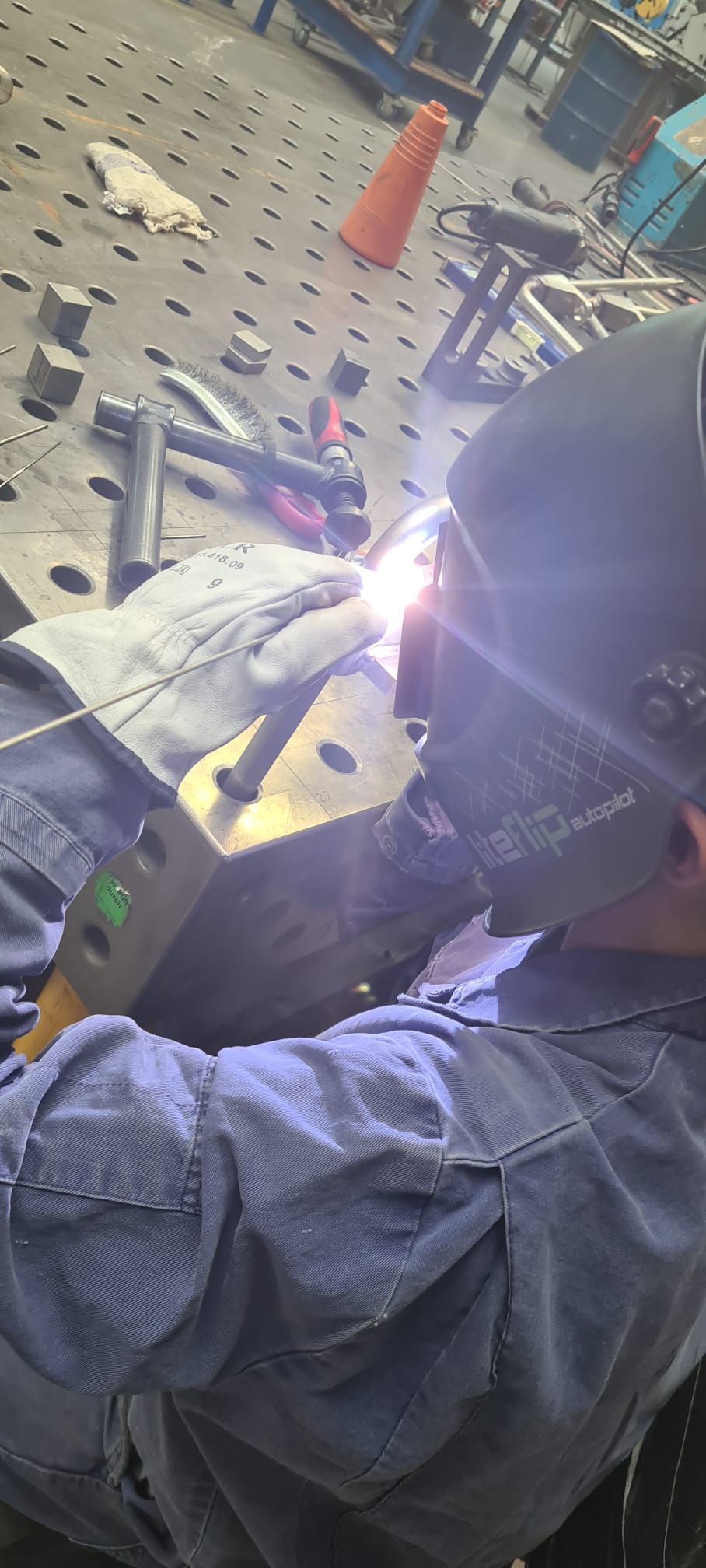
Jamie welding door handles for a battleship. (I welded the “panic room doors” for those ships, which I was proud of to have that as my first project on my name with 5 certificates)
Jamie, you are doing fabulously well for being only 21 years old! I certainly wasn’t this financially organized at 21 and I think most of the readers will concur!! I commend you for wanting to plan for your future at such a young age.
You should feel very proud that you’re taking these responsible, proactive steps. The financial choices we make as young adults can have a profound impact on our longterm financial health and overall net worth, so it is VERY exciting to work someone right at the start of adulthood!
Jamie’s Question #1: I have a difficult decision ahead as I have to choose between 2 jobs.
This is a great problem to have!! While you’ve clearly outlined the pros and cons of each job, the choice is pretty clear in my opinion: Job #2 where you’d learn TIG pipe welding.
I am (obviously) not a welder, but my husband is an amateur welder and he weighed in with his welding-related opinions:
“Absolutely take the job in TIG pipe welding as that’s a skill that’s always going to be in demand. Plus it’s almost always worthwhile to get additional training when you’re young. Stay at this job for the duration of the training program and get good at it. Learn everything you can and get as many certifications as possible from your employer. It’s an amazing gift to receive training paid for by your employer.
TIG pipe welding is a true art form and a specialized skill that people will pay a lot for. You are young and energetic, so get good at all the weird body positions you can be put in while pipe welding (above your head, around a bend, etc). There are thousands of miles of piping in the world that need to be welded by a talented TIG pipe welder. Anywhere where there’s industrial activity, there’s a need for highly skilled TIG pipe welders. Knowing TIG pipe welding should open up international jobs for you.
One thing to keep in mind is that welding can be on a boom/bust cycle because the major consumers of pipe welding are related to oil and gas. When oil and gas are booming, there’s a ton of money to be made. When they’re crashing, the job market is tighter. Given that, the more trainings and certifications you have, the more employable you’ll be.”
Thank you, Mr. Frugalwoods!
Ok, so he is very emphatically in favor of you learning TIG pipe welding. I then asked him about the fact that the other job would teach you MIG and he replied:
“If you’re a good TIG welder, MIG is very easy to pick up. TIG welding is much more complicated and best learned from a professional. On the other hand, you can buy a cheap MIG welder and teach yourself MIG at home.”
Beyond the TIG versus MIG conversation happening up there, here are my thoughts on why you should take the pipe welding job:
- Getting all the certifications you can while young is SO SMART. I will tell you from experience that life typically only gets busier and more complicated as you get older. Do it while you’re YOUNG and unencumbered!!!!
- Having your employer pay for this training is fantastic. Take advantage of this gift!
- It will look very good to any future employer that you stayed at this job for awhile. Future employers want to see that you stick with a job and don’t leave it after a short period of time.
- Taking this job will give you time to save more money and do more research on where you might like to/be able to work and live abroad. Also, if your relationship with your girlfriend progresses and becomes more serious, it’ll be nice to take her opinions into account as to where you might move. Working this job for a few years will give you the time to explore all of these different options and ideas.
Jamie’s Question #2: I would like suggestions on how to better my financial situation.
You are starting out from a position of strength and so most of my recommendations are to simply continue on your current path! At this point in your life, my advice is to:
1) Earn more money:
- You’re already in the process of doing this, so that’s great!
- All you can do here is work hard, get more certifications and continue to advance.
2) Stop lending money to your family members:
- This is a tricky issue and you’ve already articulated that you’re getting better at saying “no,” which I think is wise.
- Unfortunately, you may not ever be paid back by your relatives and you may have to let this money go. It’s not your fault as you were trying to be a helpful, caring person; but, it’s very possible they won’t ever pay you back.
- Going forward, I think it’ll be useful for you to come up with some tactics/strategies for protecting yourself from these requests.
- If you do decide to lend money in the future, I encourage you to think of it as a gift rather than a loan. It is very hard to recoup personal, informal loans and so, if you have the financial ability and desire to give money to a relative, perhaps re-framing it as a gift would make it more psychologically tenable for you.
3) Consider seeing a therapist to help heal your past financial trauma:
- I strongly recommend you consider going to therapy. I say this because a therapist could help you determine how to respond to requests for money from your family and also give you coping strategies for healing your past financial traumas.
- You are so young and will be in such a wonderful position later on if you deal with the emotions and trauma around these issues sooner rather than later.
- You can make no better investment in yourself than in your mental health!
- Know that financial trauma is a real thing many people suffer from and it’s not your fault.
- You mentioned you have a fear of spending money, which is another thing a therapist could help you unpack.
- Additionally, the incredibly challenging circumstance of supporting your mother after the death of your father makes me think a therapist would be a very helpful resource for you going forward.
- I’ve been to therapy a number of different times and I always emerge feeling better!
4) Determine an exit plan from your mother’s home/financial support:
- You two are very reliant upon one another financially and, as you plan to move abroad, you’ll need to work with her on how to separate yourselves.
- As you noted, your living expenses are very low due to her support and she is similarly supported by the money you’ve lent her over the years.
- Unless your longterm plan is to have your mother move abroad with you, now is the time to start talking with her about how she’ll cope without you–and vice versa.
Asset Overview
Let’s take a look at where Jamie’s money is right now.
Cash: $8,077
As it stands, this is a robust emergency fund. However, it’s important to remember that your living expenses are artificially low. Once you’re living on your own, your expenses will increase quite a bit and so you’ll need to ensure you’re maintaining your emergency fund savings once you’re paying for your own rent, utilities, food, etc.
Investments: $5,471
While it’s awesome that you’re invested in the market, keep retirement investing in mind too! I am wholly unfamiliar with retirement plans in the Netherlands, but, this is something you want to start doing as soon as possible. The earlier you begin saving for your retirement, the better off you’ll be in the long run.
I know it’s hard to think about retirement when you’re just starting your career, but your older self will thank you! Explore the retirement account options offered by your employer and/or the government and determine what will make the most sense for you to begin contributing to. My suggestion is to plug into online FIRE communities in the Netherlands to get their advice. One place to start is the Mr. Money Mustache forum sub-group Dutch Mustachians.
Looking Ahead
You’re doing everything you can at present; but, you should keep the following guidelines in mind for the future, as your income–and your expenses–increase:
- Always keep an emergency fund of three to six months’ worth of your spending:
- This is your buffer against debt and it’s an imperative part of everyone’s financial health.
- Your emergency fund should be kept in an easily-accessible account, such as a checking or high-interest savings account. It shouldn’t be tied up in illiquid assets, such as houses/cars/antique china OR the stock market.
- You should be able to withdraw the funds immediately and at any time. That’s why it’s called an “emergency fund”–it’s there to make emergencies easier.
- Part of this exercise is to always ensure you’re cash flowing your expenses every month and not spending more than you earn.
- Ensure that this stays on track as your income and expenses increase.
-
Invest for retirement:
- As noted above, it’s important to keep this top of mind and to prioritize it ahead of other investment vehicles.
- Remain debt-free:
- You’re off to a fantastic, debt-free start–aim to keep it that way!
- Optional: Explore other investment options:
- If you’ve completed steps 1-3 and are ready for more, you can start researching the world of investment options.
- Ongoing: Rebalance, check-in, scan for new investment opportunities:
- Put yourself on a schedule of checking in on all of the above:
- Is your emergency fund staying in line with your spending?
- Are you still on track for retirement?
- Have any debts cropped up that need to be paid down?
- While it’s a linear list, it’s also one you need to continually loop through because life happens and things change.
- Since you’re already invested in the stock market, you’ll want to rebalance your portfolio on a regular basis and ensure that your investments match your plans, your age, and your personal risk tolerance.
- Put yourself on a schedule of checking in on all of the above:
Jamie’s Question #3. I would like to work abroad as welder–anywhere in the world where they need a welder.
I am no welder, but here’s my general advice:
1) Make yourself desirable to future employers:
- Learn as much as you can at your next job.
- Secure all the certifications and attend all the trainings you possibly can.
- Be an awesome employee to ensure you receive great recommendations.
- The more experienced you are, the easier it’ll be for you to find a job abroad.
2) Determine if it will be easiest to remain within the EU:
- I have to imagine this will be the case. In light of that, should EU member states be the starting point for your research?
- If you’re willing to go outside of the EU, consider what parts of the world appeal to you:
- What climates do you enjoy?
- Do you want to be urban or rural?
- Do you want to be somewhere with public transit?
- What languages do you speak?
- What foods/recreation/culture do you enjoy?
- How long of a flight home are you willing to tolerate?
3) Research, research, research:
- Ask your welding colleagues for advice, read online welding forums, and research where you’d be able to get a work visa.
- Are there global companies you could work for who would send you to different parts of the world for various different jobs?
- If an employer is managing your visa paperwork, it’ll be a lot easier on you.
- On the other hand, you’ll have less control over where you go.
4) Take your time these next few years to immerse yourself in learning:
- Learn as many different types of welding as you can
- Learn as much as you can about where you’ll be able to get a job abroad
Summary:
-
Consider taking Job #2 in order to learn the skill of TIG pipe welding at your employer’s expense.
- Work with a therapist to:
- Set firm boundaries with relatives asking you for money and free labor.
- Heal the past financial and emotional traumas of your father’s death and your subsequent role as provider for your mother.
- Establish a healthy relationship with money and spending.
- Hard as it is, know that your relatives may never pay you back:
- If you decide to lend money to anyone in the future, consider it a gift, not a loan.
- Continue saving money as you have been and monitor your account balances as your income and expenses increase.
- Research retirement account options and begin saving for your retirement now.
- Begin to talk with your mother about how she’ll cope when you move abroad.
- Start making a plan with her now so that it’s not a shock when you do eventually leave.
- Start researching where you might be willing/able to work abroad.
- Feel confident and happy that you’ve put yourself in a FANTASTIC and enviable financial position! You’re going to do great!
Ok Frugalwoods nation, what advice do you have for Jamie? We’ll both reply to comments, so please feel free to ask questions!
Would you like your own Case Study to appear here on Frugalwoods? Apply to be an on-the-blog Case Study subject here. Hire me for a private financial consultation here. Schedule an hourlong call with me here, refer a friend to me here, or email me with questions (liz@frugalwoods.com).
Oh, and before I forget… Join a UFM Mastermind Group!
Money is something we’re not supposed to talk about and so many of us don’t. We harbor secret concerns, joys, frustrations, questions and don’t have an outlet for them. This is that outlet! These groups are the place to discuss every single weird money question you have. These groups are the place to share every single money success you experience. These groups are where you’ll find camaraderie and support.
There’s no question too big or too small for the groups to address because, for most of us, our financial educations began after we became adults, after we made some serious financial missteps (anyone remember my story about overdrawing my checking account in my 20s?). We feel like we SHOULD know this stuff and SHOULD be able to manage our money and so we don’t ask for help. Let yourself off the hook and come join us.
These Groups Exist to Address:











Read more here; sign-up to join here.
Never Miss A Story
Sign up to get new Frugalwoods stories in your email inbox.

